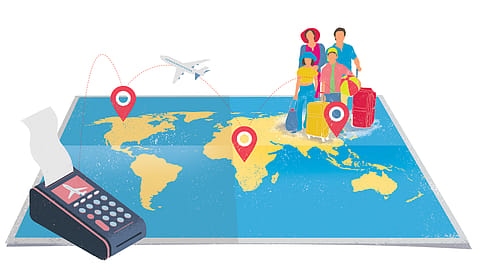Indonesia volcano disrupts flights: Is your travel insurance disaster-ready?
Flight delays, non-refundable bookings, cancellations, emergency evacuations, and even medical emergencies during the trip can be covered by travel insurance, experts say

Indonesia’s Mount Lewotobi Laki Laki erupted again on Wednesday, spewing massive plumes of ash and smoke into the sky and triggering fresh evacuations in surrounding villages. The renewed volcanic activity also disrupted air travel, leading to the cancellation of several flights that include those connecting the popular tourist destination of Bali, underscoring the growing vulnerability of travel plans to sudden natural events.
The latest eruption caused chaos for many international and domestic travellers. Airports in the affected region halted operations, with flights being cancelled, diverted or delayed. The ripple effect extended far beyond the island, resulting in missed connections, abandoned hotel bookings, and unexpected costs for accommodation, meals, and rebookings.
For travellers caught in the disruption, the financial impact has been significant. But experts say much of this could be mitigated with the right travel insurance.
“Comprehensive policies cover more than people realise,” said Surender Tonk, vice president of the Insurance Brokers Association of India (IBAI). “Flight delays, non-refundable bookings, cancellations, emergency evacuations, and even medical emergencies during the trip—these can all be covered. But it’s critical for travellers to read the fine print and ensure their policy includes protection against natural disasters. If you are heading to a high-risk destination, flexible bookings and awareness of local conditions can go a long way.”
Volcanic eruptions aren’t everyday occurrences, but they aren’t rare either, especially in the Pacific Ring of Fire, which includes parts of Indonesia. The recent disruption in Bali has been a wake-up call for travellers who often overlook the fine details in their insurance cover.
“Trip cancellation cover typically reimburses travellers for prepaid, non-refundable expenses if their journey is cancelled due to covered reasons such as natural disasters,” explained Meet Kapadia, head of travel insurance at Policybazaar. “Trip interruption, meanwhile, helps when a journey is cut short; it covers return travel, lost bookings and emergency accommodation. And trip delay benefits can offset costs for meals, hotel stays, and transport when travellers are stranded. Unfortunately, people tend to focus on baggage loss or medical emergencies, but it is these disruptions, related benefits that matter in situations like this.”
Kapadia added that travellers should also factor in the frequency of such events in certain parts of the world while planning their insurance coverage. “Volcanic eruptions, floods, or earthquakes may be unpredictable, but they are not entirely uncommon. When travelling to geographies where these risks are elevated, a broader travel policy isn’t just a smart idea—it’s essential.”
Recommended Stories
As Indonesia continues to monitor volcanic activity, travellers heading to the region should check with their insurer about the scope of their travel insurance cover. They should remain informed and take precautionary measures.